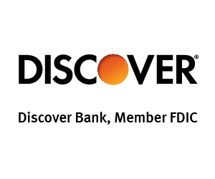If you're anything like me, you want a bank that makes your money work harder without nickel-and-diming you with hidden fees or frustrating red tape. That's why I keep a close eye on online-only banks -- they tend to offer better APYs, fewer fees, and slicker apps than the big brick-and-mortar guys.
Two names that always rise to the top: Discover® Bank and American Express National Bank (Member FDIC). I've spent time digging into both banks, and while they look similar at first glance, there are some key differences that could make one a better fit depending on what you need. Let's break it down.
Discover overview
Discover started as part of Sears in the '80s (yes, really), but over the last few decades it's reigned as one of the biggest credit card issuers in the U.S. But here's quite the shake up: Discover just merged with Capital One as of May 18, 2025. The accounts and branding are remaining separate (for now, at least), but Discover is now owned by Capital One.
Amex overview
Amex has been around since the 1800s and is best known for premium cards and its loyal customer base. It runs its own payment network and offers online deposit accounts through American Express National Bank (Member FDIC). Just know that to open some accounts, like checking, you'll need to already be an Amex cardholder.
Our methodology for scoring banks and credit unions revolves around evaluating key aspects such as annual percentage yield (APY), brand reputation, fees and minimum requirements, and additional perks.
These criteria are weighted differently across various account types, ensuring a comprehensive assessment that reflects the competitive landscape and economic conditions.
We strictly feature products that offer federal insurance and high customer satisfaction, keeping our recommendations unbiased by advertiser influence. This robust evaluation process helps us generate balanced, reliable best-of lists that guide consumers to top financial products.
Learn more about how Motley Fool Money rates bank accounts.
Our methodology for scoring banks and credit unions revolves around evaluating key aspects such as annual percentage yield (APY), brand reputation, fees and minimum requirements, and additional perks.
These criteria are weighted differently across various account types, ensuring a comprehensive assessment that reflects the competitive landscape and economic conditions.
We strictly feature products that offer federal insurance and high customer satisfaction, keeping our recommendations unbiased by advertiser influence. This robust evaluation process helps us generate balanced, reliable best-of lists that guide consumers to top financial products.
Learn more about how Motley Fool Money rates bank accounts.
Account options: Discover vs. Amex
Savings accounts
| Offer |

|

|
|---|---|---|
| Account |
American Express® High Yield Savings Account
On American Express's Secure Website. |
Discover® Online Savings
On Discover Bank's Secure Website. |
| Rating |
4.00/5
Our ratings are based on a 5 star scale.
5 stars equals Best.
4 stars equals Excellent.
3 stars equals Good.
2 stars equals Fair.
1 star equals Poor.
We want your money to work harder for you. Which is why our ratings are biased toward offers that deliver versatility while cutting out-of-pocket costs.
|
5.00/5
Our ratings are based on a 5 star scale.
5 stars equals Best.
4 stars equals Excellent.
3 stars equals Good.
2 stars equals Fair.
1 star equals Poor.
We want your money to work harder for you. Which is why our ratings are biased toward offers that deliver versatility while cutting out-of-pocket costs.
|
| APY | 3.50% Rate info 3.50% annual percentage yield as of August 6, 2025. Terms apply. | 3.50% |
| Min. to earn APY | $0 | $0 |
| Next Steps |
To qualify for Bonus: Apply for your first Discover Online Savings Account, enter Offer Code TMF325 at application, deposit into your Account a total of at least $15,000 to earn a $150 Bonus or deposit a total of at least $25,000 to earn a $200 Bonus. Qualifying deposit(s) may consist of multiple deposits and must post to Account within 45 days of account open date. Maximum bonus eligibility is $200.
What to know: Offer not valid for existing or prior Discover savings customers. Eligibility is based on primary account owner. Account must be open when bonus is credited. Bonus will be credited to the account within 60 days of qualifying for the bonus. Bonus is subject to tax reporting. Offer ends 09/11/2025, 11:59 PM ET. Offer may be modified or withdrawn without notice. Due to new customer funding limits, you may wish to initiate fund transfers at your other institution. For information on funding, see FAQs on Discover.com/Bank.
Both banks offer strong high-yield savings options with no monthly fees and no minimum deposit required. In fact, both made our list of the best high-yield savings accounts. Here's how the two stack up:
- American Express® High Yield Savings Account: 3.50% annual percentage yield (APY) (as of August 6, 2025)
- Discover® Online Savings: 3.50% APY
Rates of course can change, so it's good to note that the experience with either is top-notch -- daily compounding interest, no fees, and FDIC insurance up to $250,000. I wouldn't hesitate to stash my emergency fund in either one.
CDs
APY = Annual Percentage Yield
| Offer |

|
|---|---|
| Account | Discover® Bank CD |
| 3 Mo. | 2.00% |
| 6 Mo. | 4.20% |
| 9 Mo. | 3.50% |
| 1 Yr. | 4.00% |
| 1.5 Yr. | 3.80% |
| 2 Yr. | 3.80% |
| 30 Mo. | 3.60% |
| 3 Yr. | 3.60% |
| 4 Yr. | 3.60% |
| 5 Yr. | 3.75% |
| 7 Yr. | 3.50% |
| 10 Yr. | 3.50% |
| Min. Deposit | $0 |
| Early Withdrawal Penalty | Yes |
| Next Steps |
If you're looking to lock in a rate for a set term, both banks offer solid CD rates for a wide range of terms:
- Discover® Bank CDs: Terms from 3 months to 10 years. Best rates (up to 4.00% APY for 12 months) fall in the 6- to 24-month range.
- American Express National Bank (Member FDIC) CDs: Nine terms from 11 months to 5 years. The CD offers APY. The CD also offers APY, with slightly lower yields on other terms.
No minimum deposit required with either bank, but Discover has more variety if you're looking for a specific timeline.
Money market accounts
Discover® Money Market
On Discover Bank's Secure Website.

On Discover Bank's Secure Website.
- Competitive APY
- No minimum balance to maintain account
- No monthly fee
- Debit card and check availability
- No minimum deposit required to open
- FDIC insured
- Best rate requires at least $100,000
- No in-person banking/branches
This account offers a competitive APY, especially given there are no monthly service fees, while still giving access to ATMs and checks. You don't need to maintain a high balance to earn a good rate.
Only Discover offers a money market account. It pays 3.40%-3.45% APY, depending on your balance, and doesn't have any monthly fees or opening minimums. If you want the flexibility of check-writing or easier access to your funds, it's a solid pick.
APY comparison
Overall, American Express National Bank (Member FDIC) wins for APY by a hair. But Discover pulls ahead with its CD lineup.
I've found that the rate differences between these two aren't massive, especially if you're not keeping large balances in CDs. So while APYs matter, they're just one piece of the puzzle.
Customer service
Both banks offer 24/7 phone support, which is more than I can say for a lot of traditional banks. American Express National Bank (Member FDIC) also offers online chat, which I love when I need quick answers.
Mobile apps
App Store ratings as of June 2025:
- Discover: 4.9 stars (iOS), 4.3 stars (Android)
- American Express National Bank (Member FDIC): 4.9 stars (iOS), 3.8 stars (Android)
Discover's app is super intuitive and lets you check balances without logging in with something called Quick View (huge time-saver). It also supports Zelle and remote check deposits. Amex's banking app is functional but seems to lag on Android -- not a dealbreaker, but worth noting.
Which bank is right for you?
If you already have an Amex card and want to keep your banking under one roof, American Express National Bank (Member FDIC) makes a lot of sense.
But if you're new to digital banking or just want a more flexible experience with more product options, I'd go with Discover. I love how it combines no-hassle banking with strong customer service and competitive rates.
Both are solid choices. It really comes down to what features matter most to you -- cash back vs. interest, open access vs. member-only perks, app preference, and so on.
Want to get started?
Whichever route you take, you'll get a high-yield account with zero monthly fees -- and that's a win in my book.
-
Review sources
- https://www.discover.com/company/our-company/
- https://www.discover.com/
- https://www.americanexpress.com/en-us/company/who-we-are/
- https://www.discover.com/online-banking/savings-account/
- https://www.americanexpress.com/en-us/banking/online-savings/high-yield-savings-account/
- https://www.americanexpress.com/en-us/banking/checking-account/
- https://www.discover.com/online-banking/cd/
- https://www.americanexpress.com/en-us/banking/online-savings/cd-account/#cdCarousel
- https://www.discover.com/online-banking/money-market/
- https://www.americanexpress.com/en-us/banking/online-savings/contact-us/
- https://play.google.com/store/apps/details?id=com.discoverfinancial.mobile&hl=en_US
- https://play.google.com/store/apps/details?id=com.americanexpress.android.acctsvcs.us&hl=en_US
- https://apps.apple.com/us/app/discover-mobile/id338010821
- https://apps.apple.com/us/app/amex/id362348516
FAQs
-
Only for checking. You can open a high-yield savings or CD account without an Amex card, but the American Express Rewards Checking account is only available to existing Amex customers.
-
Nope. Discover doesn't charge monthly maintenance fees on any of its deposit accounts, and there's no minimum to open either.
-
Discover has a huge variet of CD term lengths, while Amex is more limited but competitive between the 14- and 24-month range.
We're firm believers in the Golden Rule, which is why editorial opinions are ours alone and have not been previously reviewed, approved, or endorsed by included advertisers. Motley Fool Money does not cover all offers on the market. Motley Fool Money is 100% owned and operated by The Motley Fool. Our knowledgeable team of personal finance editors and analysts are employed by The Motley Fool and held to the same set of publishing standards and editorial integrity while maintaining professional separation from the analysts and editors on other Motley Fool brands. Terms may apply to offers listed on this page. APYs are subject to change at any time without notice.
